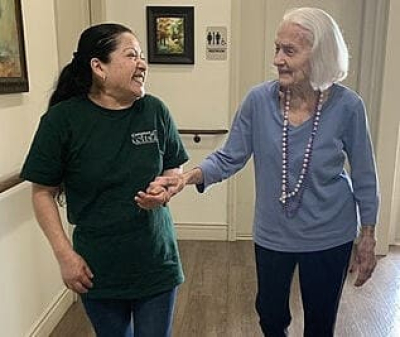Empathy towards our Caregivers at Home and In Assisted Living Communities Click here to Read
Empathy towards our Caregivers
The definition of empathy is: The action of understanding, being aware of, being sensitive to, and vicariously experiencing the feelings, thoughts and experience of another of either the past or present without having the feelings, thoughts, and experience fully communicated in an objectively explicit manner.
In other words, empathy means being able to put yourself in someone else’s shoes for a while so you can imagine what it is they are going through.
Our focus here is on Caregiver Empathy. A caregiver can be a family member, spouse, child relative or even a distant relative. They could also be someone who is close to the one they are caring for, such as a neighbor or a friend.
More and more people are turning to Paid Caregivers to provide the support necessary to care for seniors who are challenged with chronic ailments such as Alzheimer's disease or other Dementias.
It is understandable then, that we may not fully believe that a Paid Caregiver could impart the love and empathy we or a close relative could have for our loved ones.
This assumption ignores the underlying truth about most caregivers who choose to serve our seniors by training for these positions. Most if not all caregivers working in Assisted Living and Memory Care communities have been caregivers to their own loved ones. They have walked their walk, having taken care of an elderly parent, relative or sibling.
Their experience in doing the family caregiving work voluntarily for many years has an impact on their decision to join the professional caregiving work.
Caregivers will relate that the fulfillment they derive from caring for seniors is unparalleled in other work they have undertaken.
Observing these angels at work will reveal the compassion they feel for those they care for. They have chosen this path because of the empathy they feel for others and their caring nature. Giving back to the community is their nature and they do this by sharing their love for your parents and family members. Observing them working will give you a sense of their unwavering passion for seniors.
We are very fortunate to have an empathetic team of Caregivers that keep Evergreen Cottages at the top of the care pyramid.
Our Caregivers develop relationships daily with your Loved Ones and are there for them when they need them, 24 hours a day, 365 days a year, providing Loving care with compassion.
When caring for your loved one, you too deserve the same care and empathy imparted to your loved one. Caring for your loved one can be a rewarding experience, however it is also possible to feel anxious, stressed and worn out from performing your caregiving duties.
It is okay to find help, particularly if your loved one requires ongoing care for Alzheimer's Disease or other dementia. Seek out the services of trained communities with empathetic caregivers. You will thank yourself that you did.




